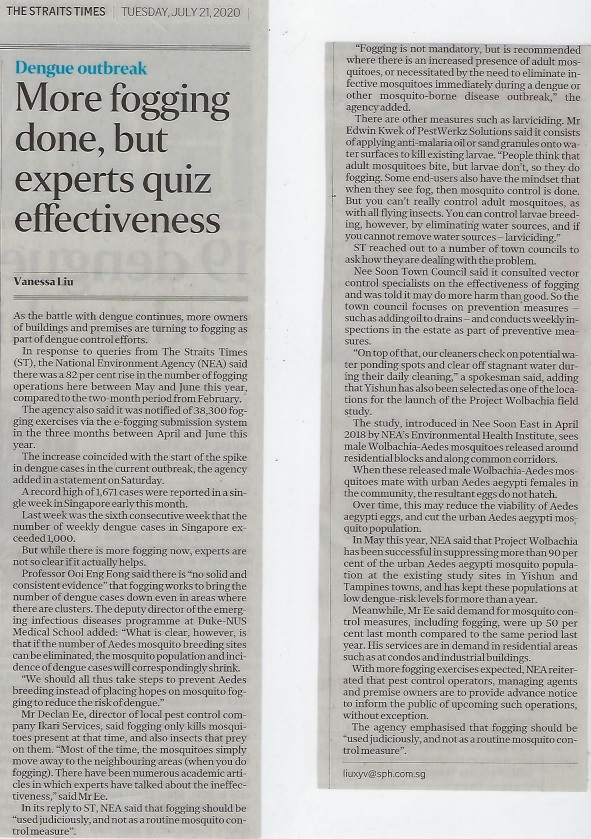
More fogging done, but experts quiz effectiveness
29 Dec 2022As the battle with dengue continues, more owners of buildings and premises are turning to fogging as part of dengue control efforts.
In response to queries from The Straits Times (ST), the National Environment Agency (NEA) said there was a 82 per cent rise in the number of fogging operations here between May and June this year, compared to the two-month period from February.
The agency also said it was notified of 38,300 fogging exercises via the e-fogging submission system in the three months between April and June this year.
The increase coincided with the start of the spike in dengue cases in the current outbreak, the agency added in a statement on Saturday.
A record high of 1,671 cases were reported in a single week in Singapore early this month.
Last week was the sixth consecutive week that the number of weekly dengue cases in Singapore exceeded 1,000.
But while there is more fogging now, experts are not so clear if it actually helps.
Professor Ooi Eng Eong said there is "no solid and consistent evidence" that fogging works to bring the number of dengue cases down even in areas where there are clusters. The deputy director of the emerging infectious diseases programme at Duke-NUS Medical School added: "What is clear, however, is that if the number of Aedes mosquito breeding sites can be eliminated, the mosquito population and incidence of dengue cases will correspondingly shrink.
"We should all thus take steps to prevent Aedes breeding instead of placing hopes on mosquito fogging to reduce the risk of dengue."
Mr Declan Ee, director of local pest control company Ikari Services, said fogging only kills mosquitoes present at that time, and also insects that prey on them. "Most of the time, the mosquitoes simply move away to the neighbouring areas (when you do fogging). There have been numerous academic articles in which experts have talked about the ineffectiveness," said Mr Ee.
In its reply to ST, NEA said that fogging should be "used judiciously, and not as a routine mosquito control measure".
"Fogging is not mandatory, but is recommended where there is an increased presence of adult mosquitoes, or necessitated by the need to eliminate infective mosquitoes immediately during a dengue or other mosquito-borne disease outbreak," the agency added.
There are other measures such as larviciding. Mr Edwin Kwek of PestWerkz Solutions said it consists of applying anti-malaria oil or sand granules onto water surfaces to kill existing larvae. "People think that adult mosquitoes bite, but larvae don't, so they do fogging. Some end-users also have the mindset that when they see fog, then mosquito control is done. But you can't really control adult mosquitoes, as with all flying insects. You can control larvae breeding, however, by eliminating water sources, and if you cannot remove water sources - larviciding."
ST reached out to a number of town councils to ask how they are dealing with the problem.
Nee Soon Town Council said it consulted vector control specialists on the effectiveness of fogging and was told it may do more harm than good. So the town council focuses on prevention measures - such as adding oil to drains - and conducts weekly inspections in the estate as part of preventive measures.
"On top of that, our cleaners check on potential water ponding spots and clear off stagnant water during their daily cleaning," a spokesman said, adding that Yishun has also been selected as one of the locations for the launch of the Project Wolbachia field study.
The study, introduced in Nee Soon East in April 2018 by NEA's Environmental Health Institute, sees male Wolbachia-Aedes mosquitoes released around residential blocks and along common corridors.
When these released male Wolbachia-Aedes mosquitoes mate with urban Aedes aegypti females in the community, the resultant eggs do not hatch.
Over time, this may reduce the viability of Aedes aegypti eggs, and cut the urban Aedes aegypti mosquito population.
In May this year, NEA said that Project Wolbachia has been successful in suppressing more than 90 per cent of the urban Aedes aegypti mosquito population at the existing study sites in Yishun and Tampines towns, and has kept these populations at low dengue-risk levels for more than a year.
Meanwhile, Mr Ee said demand for mosquito control measures, including fogging, were up 50 per cent last month compared to the same period last year. His services are in demand in residential areas such as at condos and industrial buildings.
With more fogging exercises expected, NEA reiterated that pest control operators, managing agents and premise owners are to provide advance notice to inform the public of upcoming such operations, without exception.
The agency emphasised that fogging should be "used judiciously, and not as a routine mosquito control measure".
